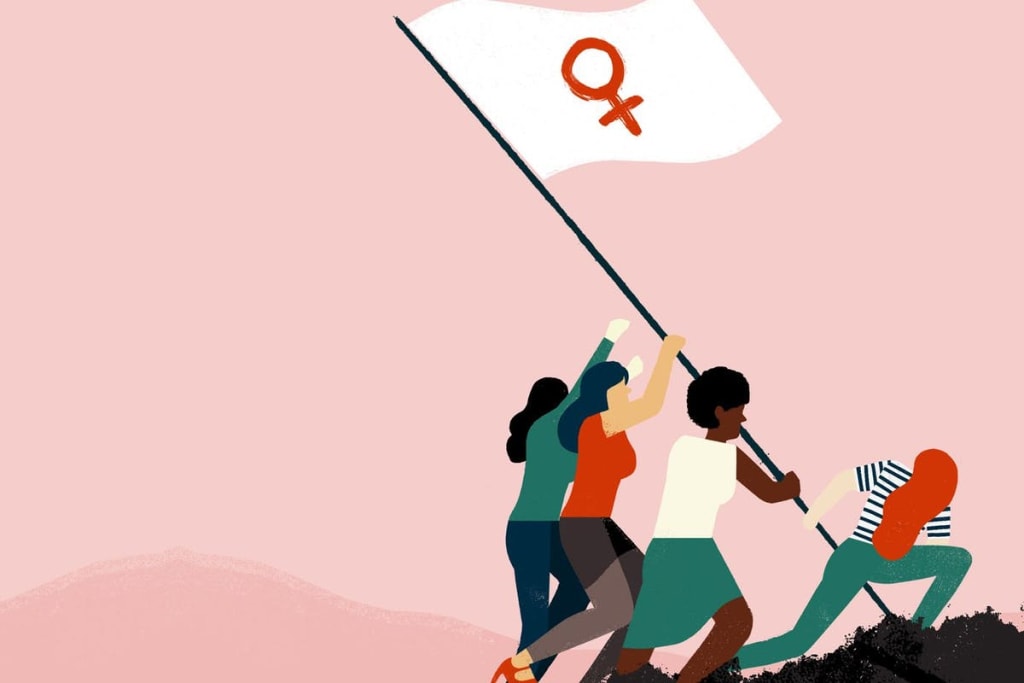Are you sure that "We don't need Feminism anymore"?
Why we do still need Feminism.

The statement that we don't need feminism anymore may be regarded as true by the women that British feminism has historically benefitted; mainly the middle/upper class, white women that the Suffragette movement of the early 1900’s was led by. In 1918, female property owners over the age of 30 were finally granted the right to vote in the General Election, which we regard today as a momentous achievement for British women. However, “property owners” clearly left out any woman who was poor. And Suffragettes such as Millicent Fawcett and Josephine Butler used the idea of superior British imperialism as a way to win their rights, through portraying Indian women living in England as enslaved and primitive. Through these concepts, white women were able to place themselves at a higher social standing to get what they desired.
The first petition that women put out in an effort to be able to vote, in 1866, was agreed with all signatures coming from white hands except one: a single black women called Sarah Parker Remond who signed it; becoming the first woman of colour who famously participated in a women’s rights movement in the UK. Now, we only think of white names when we talk about the Suffragettes, but the names of women of colour are always forgotten.
This disparity between different women remains prevalent in contemporary British society. Someone who says that “gender equality has been achieved in Britain so we don't need feminism anymore" may explain this by saying that the Royal Family is headed by a woman, therefore we have a valid example of a woman in power, with full autonomy and control over her life. However, this fails to consider that royalty is never representative of a country’s true people and nothing this family does is what the people of Britain do. No woman in the country leads the life the Queen does, and neither can they exercise the same amount of power in their families. Cultural gender differences inside the home count as one barrier within this diverse country. The fact that many women work a triple shift counts as another barrier. If she cannot represent the people, she fails as an argument for overall gender equality.
Statistically, the inequalities that still exist in Britain are most noticeable in the gender pay gap, seeing as 80% of women in the country feel that there’s still some progress to be made, according to a YouGov survey. This is reasonable seeing as, in 2019, women on average were earning 83p compared to a man’s £1. Ladies, when a man tells you the gender pay gap is a myth, make sure he has some level of education before wasting your time on someone who refuses to read.
Another major field which remains a worry is the prevalence of domestic violence and sex crimes. In 2012, 43% of women between 18 and 34 had experienced sexual harassment in public. In 2011, 45,000 cases of domestic violence and 3,000 cases of rape were reported. Although these figures are already high, they don't speak of the unreported crimes that are taking place on a daily basis, with victims who feel too scared or hopeless to speak up. Some people may now be thinking of a counter-argument, but I thought about it before you. Life for women seems to have gotten better in the past decade because of the impact of movements such as #MeToo. But even more recently, having multiple lockdowns as a result of COVID-19 puts many women in vulnerable positions they can't leave, meaning the rates of reports will potentially go up once these women can escape post-pandemic. We are likely heading for a traumatised society that we'd be evil to ignore.
In my experience, people of any gender are quick to say feminism isn’t needed here and that we should focus on other issues. But they're overlooking the real victims of the patriarchy simply because their own personal experiences may not be the same as theirs. Although it’s crucial that gender equality activists in countries like England use their privileges to speak up for the underrepresented in other places, it is also important that we don’t forget the issues that remain in subtle ways across multiple sectors that still affect us, whether or not we realise or even care.
There is a huge misconception of what feminism has turned into today: a man-hating lesbian movement of women who simply don’t want to shave or wear a bra. However, the things that women deal with daily are undeniably still here, from small issues (such as the differentiation of Miss vs Mrs vs Ms depending on your (extremely important!) marital status, while men simply need a Mr), to bigger problems (like how 1 in 10 girls in the UK aged 14-21 can’t afford much-needed menstrual products).
No, I'm not denying that we're much better off than other countries, in which 200 million girls have suffered FGM, 62 million girls are completely denied education, and 28 girls each minute are forced into child marriage. In comparison, our problems might seem trivial. But comparing the trauma of these cases to the trauma of period poverty, understated sexual harassment, and online abuse is not useful or helpful to anyone who deals with any of the situations I've just mentioned.
Just like the next woman, I want to help out my sisters living in disadvantaged communities, poorer countries, and unstable situations. It is heart-breaking to think about what they go through, and how it could've been me or any of the women in my life. But it is redundant if I focus on that and choose to ignore my own problems, because there is rampant misogyny in my own life although it's sometimes subtle. I choose to be a woman who cares and tries to do something about all of it.
There is no reason we cannot continue what British and international feminist movements have started over the past century, because we only limit ourselves if we say we have achieved the best society we can in terms of gender equality. There is a better society we should imagine and strive for. Of course, the need for an worldwide feminist effort is as strong as ever, but nothing will be achieved now if the people mislead ourselves into thinking there is nothing to be achieved.
About the Creator
Frida Shah
Someone with some opinions hoping to be heard.
She/They.






Comments
There are no comments for this story
Be the first to respond and start the conversation.